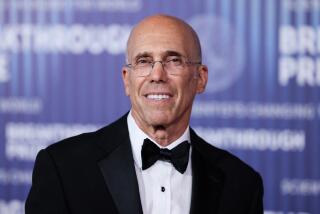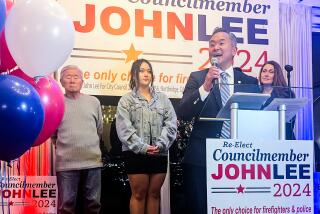Assemblyman Katz May Join Long List in ’93 Mayoral Race
- Share via
At a time when most of his peers in the Legislature are worrying about their 1992 reelection campaigns, Assemblyman Richard Katz is quietly taking soundings for a possible 1993 run for mayor of Los Angeles.
Katz, a moderate Democrat from Sylmar who wears cowboy boots and favors country and Western music, has discussed the race with a range of local movers and shakers, including Los Angeles Area Chamber of Commerce chief Ray Remy and representatives of actor Richard Dreyfuss and musician Don Henley, who have supported Katz in his Assembly campaigns.
If Katz, 40, does run, he will be part of what is likely to be a large field of candidates vying to succeed Mayor Tom Bradley, who has not yet declared if he will seek election to an unprecedented sixth term.
Others mentioned as possible mayoral candidates include City Council members Zev Yaroslavsky, Michael Woo, Nate Holden, Richard Alatorre, Joy Picus and Joan Milke Flores; former Assemblyman Mike Roos; RTD Chairman Nikolas Patsaouras and Rep. Howard Berman (D-Panorama City).
Several political observers said that given his low-name recognition outside his central San Fernando Valley Assembly district and the likelihood that other candidates will have richer campaign war chests, Katz must be considered an underdog.
But they added that the assemblyman--an artful, telegenic politician considered hard-working and imaginative--has the potential to gain momentum rapidly.
“He’s the least predictable of the bunch,” said Marc Litchman, a Sherman Oaks-based Democratic political consultant and onetime Katz aide. “He has the least baggage. In this race, the person sitting at the pole position isn’t necessarily going to win the race.”
After 11 years in the Assembly, Katz has a reputation as a hard-driving lawmaker who is more adroit than most at attracting media attention. He is popular with union leaders and environmentalists and has built bridges to Latino and black communities outside his district.
A death penalty supporter who also backs abortion rights, Katz has positioned himself as a mainstream politician who can attract votes from both Democrats and Republicans, liberals and conservatives.
As chairman of the powerful Assembly Transportation Committee, he has staked out a high-profile issue that could give him considerable political mileage among commute-weary Los Angeles voters. He was a prime architect of last year’s narrow victory for the state gas-tax initiative, which is expected to generate $20 billion to expand California freeways and mass transit systems.
The lawmaker made headlines in recent months with an eyebrow-raising proposal to turn the bed of the Los Angeles River into a roadway for car-pools and trucks.
The concept was blasted by local environmentalists. Other skeptics warned that seasonal rains might endanger motorists. But the idea also underlined Katz’s knack for creative political thinking, and he has pledged to press forward with it.
In an interview last week at his Sacramento office, Katz said if he runs for mayor, he will attempt to present himself as a candidate outside the established City Hall power structure who can “make L.A. work again.”
“Part of my talent is getting things done,” he said, sitting a few feet from a large color blowup of himself atop a Big Sur ridgeline during a hike last year, wearing a two-day beard and guzzling from a water bottle.
“Another part is being able to lay out an agenda and be straight with people about what it’s going to take to get those things done and then making it happen.”
Assuming no other Valley-based candidate, such as Berman or Picus, enters the mayoral race, Katz will have the advantage of a strong base in a geographically large, vote-rich part of the city. He hopes to use his Valley roots to pitch another theme: that there should be a more equitable distribution of city economic benefits.
“What I think is a common thread through a lot of what I’m hearing is the prosperity that Los Angeles has seen has been primarily concentrated in the downtown and the Westside,” he said.
“You hear it raised in terms of the Valley’s fair share or the Eastside’s fair share or South-Central or the Harbor. In all those areas, I think the issue of how we spread that prosperity through the rest of the city is a valid issue. . . . Coming from the Valley gives me an understanding of what it’s like to feel like you haven’t gotten your fair share.”
But some consultants said Katz might have trouble selling the outsider image. Although he has not held city office, he has had a long tenure in the Legislature, which polls indicate is held in low esteem by many voters.
“The upside is he’s not part of the established political structure” at City Hall, said Democratic political consultant Kam Kuwata of Venice. “The downside is that he’s not totally outside the process. To run as an outsider--he’s not pure on that front.”
Republican political pollster Arnold Steinberg said Katz’s economic-redistribution pitch runs the risk of appearing to pit different areas against one another.
“He’s got a tough situation, because he’s got to convince the Valley it’s not getting its fair share of services relative to taxes while at the same time not alienating the rest of the city, which may feel that if elected mayor he’d be the Valley’s guy,” Steinberg said.
Several analysts said Katz’s well-known tendency to lose his temper could be a major liability in the mayoral campaign. A blowup during the race--especially with television cameras present--could badly damage his candidacy, they said.
“Richard needs to control his temper,” said Democratic political consultant Rick Taylor, who worked with Katz on George McGovern’s 1972 presidential campaign.
“He’s got to be careful that he doesn’t . . . blow up if someone personally attacks him. What the public doesn’t want to see is public officials out of control.”
But Katz said most of his flare-ups have been directed at state bureaucrats, insisting that he can keep an even keel in a high-pressure, citywide campaign.
“The temper tends to be because I’m impatient,” Katz said. “I get frustrated when things don’t get done. Where it has been directed usually is at agencies or bureaucracies which I perceive as standing in the way of doing things.”
Observers said that while an undivided Valley base is a good jumping-off point for a citywide campaign and might even supply enough votes to propel Katz into a runoff, he must win support in other areas of the city.
Katz said he has won support in the Eastside and in South-Central Los Angeles with, among other things, his efforts to make it easier to seize liquor licenses from store owners who sell to minors.
Larry Fondation, staff director for United Neighborhoods Organization, a church-based community-action group in East Los Angeles, said Katz has “been an ally on some things. He’s held in some regard among some of our members.”
But Fondation said if a popular Latino or black candidate were in the race, “it’s going to change the appeal and attractiveness of any Anglo candidate.”
Analysts said Katz, who once served as president of the Santa Monica Democratic Club, might also find a base of support in the Westside, especially if no other Jewish politician enters the race.
Katz said he expects to have sufficient money for the mayoral race, which observers believe will cost serious candidates $1.5 million to $2 million apiece.
But several analysts said Katz will probably lag significantly behind some candidates--especially Yaroslavsky and Woo--in fund raising.
Kuwata, the political consultant, said: “He’s an imaginative and creative guy. The question is, can he put together a base to communicate . . . beyond his little niche in the Valley?”
More to Read
Sign up for Essential California
The most important California stories and recommendations in your inbox every morning.
You may occasionally receive promotional content from the Los Angeles Times.













